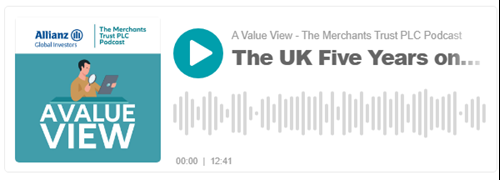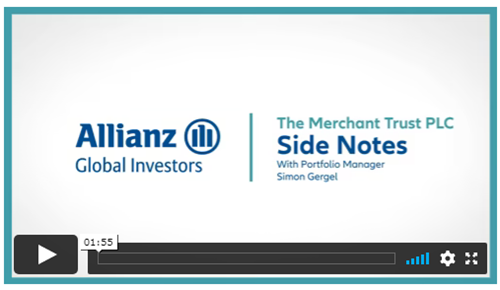The Merchant's Trust Plc: The UK Five years on


This is an extract from the latest episode of the ‘A Value View’ podcast from The Merchants Trust. In each edition Simon Gergel, fund manager at The Merchants Trust, offers his thoughts
on developments affecting the UK market and what it means for investors.
The UK, five years on
Five years ago, the UK made a momentous decision; in the national referendum to decide whether the UK should remain a member of the European Union, Britons voted to leave. Almost 50 years of UK membership of the largest trading bloc in the world came to an end.
Since then, the UK has seen multiple changes in government, navigated acrimonious exit negotiations and signed, finally, a new EU/UK trade and cooperation treaty. So, what has all this meant for the UK market?
It has certainly been an extraordinary five years, and not just Brexit discussions and uncertainty. We’ve had the pandemic to deal with, plus the prospect of a quite far left-wing government in the middle as well, so it’s been a period of extreme volatility in financial markets and in the economy.
Although it’s been challenging, it’s been a very profitable period for investing. When I was learning to drive, I was taught when you’re on the motorway you need to look not at the cars around you, but at the cars a long way in the distance to work out what’s coming.
That’s been the guiding rule for us for the last four or five years: to look at what businesses are going to be like in three- or four-years’ time; to try and look through Brexit uncertainty, through political uncertainty, and most recently through the pandemic uncertainty, and take advantage if share prices move a long way out of line.
There were periods of severe dislocation in markets, different sectors and different stocks and we managed to take advantage of that overall and come out with a good result in terms of the performance of The Merchants Trust and the portfolio within that. Although it’s been a challenging period, we’re very pleased with how we navigated it.
Land of opportunity
It has been an uncertain, challenging time economically and politically for the UK, but when it comes to the markets, there are opportunities we’ve been able to take advantage of.
The most obvious was during the pandemic last year where the market fell very sharply. Within that there was enormous dislocation and dispersion between companies that were seen as more resilient, and companies more exposed to a slowing economy and some of the issues around travel and isolation we’ve had to deal with.
There were some fantastic opportunities for a value investor to pick up really strong companies at unusually depressed prices last year. There were periods when we were concerned about the prospect of quite a hard left government, and also opportunities during the Brexit negotiations when investors got concerned about the outlook for the UK generally, and the whole UK market got quite depressed. It’s been a really interesting period; the UK market’s still pretty cheap and although you are starting to see investors coming back to the UK, there are still big opportunities.
International interest
We are starting to see flows of money from abroad now that the UK has come through the Brexit negotiations and the economy is still doing OK; the pandemic brought a major recession, but we are also recovering from that. The vaccine rollout in the UK is also leading to investors looking again.
But I think most importantly, valuations of the UK stock market are not only below historical levels, but significantly cheaper than many markets around the world, and that’s got investors interested again. In fact I was recently interviewed by a French media company about opportunities in the UK, which is the first time that’s ever happened, so definitely an interesting period for the UK.
Brexit – good for the Trust?
It’s given us opportunities; we’ve said many times, if you look at the UK stock market rather than the UK economy, about three-quarters of the profits of companies actually come from abroad. Many multinational or global businesses are listed in the UK, so Brexit for many of them is just a minor issue in a small part of their operations.
For most companies Brexit doesn’t really make much difference; to the extent that the stock market has devalued or lowly valued UK companies because of Brexit. There have been some great opportunities to buy companies that are listed in the UK but have operations all over the world and in that respect there have been opportunities to exploit the Brexit uncertainty. There are one or two industries where the risks of Brexit were significant and real, but those are in the minority and have not affected us too much.
UK plc ripe for takeovers?
There’s a lot of activity, both from private equity but also from corporate buyers looking at the valuations of UK businesses and coming in with takeover approaches. We’ve seen a few quite recently: one in the retail food sector, and one in defence. But it’s quite curious because at the same time, there’s also a lot of IPOs: a lot of new issues coming, new launches on the stock market.
Investors are favouring certain types of businesses – maybe high growth, digital businesses, often without much of a track record or profitability, but businesses that have been around a long time are being neglected and trading at quite modest valuations. So there’s a quite strange dilemma where there’s money for certain types of companies, but others are languishing behind and being identified by foreign companies or private equity.
New share listings a measure of sentiment?
We have to be careful drawing too much of a conclusion. It’s been very difficult to list a company, particularly in the UK, for the last four or five years for the reasons mentioned above: political risk, Brexit risk, pandemic. Some businesses have been maturing and getting to the stage where raising money from other investors or releasing capital for the founders makes sense, so it’s more the latter: it’s just the right time for them and those are the types of companies that are attracting investors. They’re not necessarily the type of businesses that are more under pressure, say in the aerospace or defence area or some of the more traditional UK businesses.
How long can the UK market offer good value?
That’s the million-dollar question; it’s really hard to know how long this takes to play out. We try not to guess or estimate the answer to that, because it’s almost unknowable. We just try to identify good companies trading at low valuations, which allow us to generate a good return for our investors including a decent dividend yield.
I don’t think that discount or that low valuation can persist forever, but it could persist for a long time and if so, that gives good opportunities for us to continue to invest on behalf of our shareholders.
There are a number of quite interesting themes. We still see value in the whole housing area in terms of both house builders but also companies selling products into the housing market and to people moving home, because a bit like the stock market, actually, there was uncertainty for four or five years; many people didn’t move home and didn’t spend much money on their house.
Now a wave of money is being unlocked and spent on the home environment. People spending more time at home want to sit on more comfortable furniture and so on; that whole area is still quite interesting. Valuations are still quite reasonable, even for very good companies and market leaders, so that’s an interesting area. We’re also finding companies that are helping the energy transition are quite interesting in the utility area.
There are companies that are transitioning their business, so historically part of the business was maybe seen as low-growth or unexciting, but they’re gradually transitioning to more exciting, high-growth areas, and that can often be a great place to be as a value investor, because you can get in at low valuation and then potentially sell out a few years down the road at a high valuation because the business’ quality improved.
Enough opportunity in the UK market?
We haven’t run out of opportunities yet. We do have a small amount of the portfolio in continental European shares, largely in the reinsurance industry, which is an industry that’s quite hard to get exposure to in the UK. But there are still plenty of opportunities in the UK.
What’s the longer-term outlook for the market and for dividends?
Keeping the eye on the horizon again, the outlook is good. Dividends were cut last year by pretty much a record amount. In fact, I think last year was the first time dividends had fallen as much as earnings in a recession, although it was clearly an extraordinary period. But we’re now seeing record revisions to dividend expectations across Europe, i.e. people expecting dividends to pick up quicker than they thought.
And dividends are coming from a low base, so there’s plenty of scope for company dividends to recover and to grow from here, and many of the companies where the dividend levels might have looked unsustainable before, have taken the opportunity to rebase to a lower level. So from here, albeit we’ve had a big cut in the income level coming into the portfolio, I think we do see scope for quite decent dividend growth, potentially for quite a long time into the future.
Find out more about The Merchants Trust here >
Listen tot he podcast - click here
Side Notes – the inflation quandary
In this 2-minute update, Simon Gergel discusses rising inflation and the implication both for individual companies and for markets and investing more generally as a result of interest rate policy.
All sources Allianz Global Investors GmbH unless otherwise noted. This is no recommendation or solicitation to buy or sell any particular security. A security mentioned as example above will not necessarily be comprised in the portfolio by the time this document is disclosed or at any other subsequent date. Investing involves risk. The value of an investment and the income from it may fall as well as rise and investors may not get back the full amount invested. Past performance is not a reliable indicator of future results. The views and opinions expressed herein, which are subject to change without notice, are those of the issuer and/or its affiliated companies at the time of publication.
This is a marketing communication issued by Allianz Global Investors GmbH, an investment company with limited liability, incorporated in Germany, with its registered office at Bockenheimer Landstrasse 42-44, D 60323 Frankfurt/M, registered with the local court Frankfurt/M under HRB 9340, authorised by Bundesanstalt für Finanzdienstleistungsaufsicht (www.bafin.de). Further information on Investor Rights are available here (www.regulatory.allianzgi.com). Allianz Global Investors GmbH has established a branch in the United Kingdom, Allianz Global Investors GmbH, UK branch, 199 Bishopsgate, London, EC2M 3TY, www.allianzglobalinvestors.co.uk, deemed authorised and regulated by the Financial Conduct Authority. Details of the Temporary Permissions Regime, which allows EEA-based firms to operate in the UK for a limited period while seeking full authorisation, are available on the Financial Conduct Authority’s website (www.fca.org.uk). Details about the extent of our regulation by the Financial Conduct Authority are available from us on request. The Merchants Trust PLC is incorporated in England and Wales. (Company registration no. 28276). Registered Office: 199 Bishopsgate, London, EC2M 3TY.
Read the latest edition of DIY Investor Magazine
DIY Investor Magazine
The views and opinions expressed by the author, DIY Investor Magazine or associated third parties may not necessarily represent views expressed or reflected by EQi.
The content in DIY Investor Magazine is non-partisan and we receive no commissions or incentives from anything featured in the magazine.
The value of investments can fall as well as rise and any income from them is not guaranteed and you may get back less than you invested. Past performance is not a guide to future performance.
DIY Investor Magazine delivers education and information, it does not offer advice. Copyright© DIY Investor (2016) Ltd, Registered in England and Wales. No. 9978366 Registered office: Mill Barn, Mill Lane, Chiddingstone, Kent TN8 7AA.

